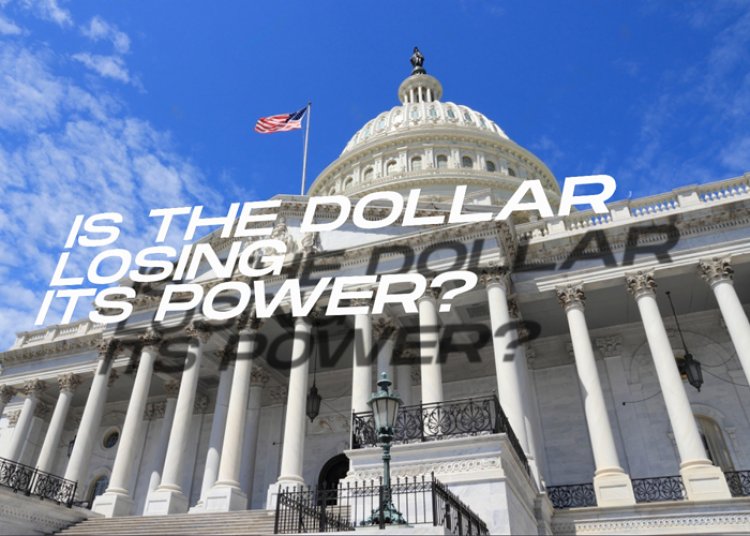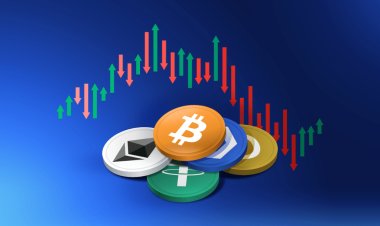Is the Dollar losing its power?
Explore insights on the shifting strength of the US dollar in the global market. Understand its potential impact on the economy and your investments.

Is the Dollar losing its importance?
The US dollar's status as a reserve currency is unlikely to be challenged, but other countries are working on de-dollarization and other currency formats while the West gets ready for a fully controlled communist digital dollar.
The weakening of the US dollar and its history as a reserve currency, including the creation of the fiat currency system and the challenges posed by the euro, and China's rise as an export giant.
After collecting gold and silver, the US dollar became the world's reserve currency. However, after the Vietnam War and President Nixon's decision in 1971, the US dollar lost trust and could no longer be exchanged for gold.
The fiat currency system, which is not backed by anything and is printed out of thin air, was set up in 1971. The world became fully dollarized in 1973 with the idea of the Petrodollar, which led to inflated assets and the dot-com bubble in the mid-1990s.
When EU allies started using the euro currency, it was a challenge to the dollar's status as the reserve currency. However, when the Glass-Steagall Act was repealed in 1998, banks were able to mix public deposits with speculative trades, which helped cause the reserve currency bubble.
When the dot-com bubble burst and the European Union stopped putting its savings in the US Treasury, the US invited China to join the World Trade Organization. This made the Chinese Communist Party a major exporter and manufacturer, but the first-ever attempt to de-dollarize caused the value of the IT sector to drop by 78% by October 2002 and printing more money to fix the economy after the 2008 crisis caused inflation to spread.
During the Arab Spring, the Gulf realized that it cost a lot to keep the dollar as the world's reserve currency. For example, it cost them 50% of their crude oil wealth.
The US dollar's status as a reserve currency isn't likely to change because the rest of the world trusts it and it can print money indefinitely. However, other countries are working towards depolarization and other currency formats.
People around the world trust and use the US dollar, which makes it unlikely that any other currency will replace it.
The only reason people trust the US dollar is that it can be printed indefinitely. They don't trust the US military, government, economy, or the currency itself.
The European Union's attempt to challenge the US dollar's status as the world's reserve currency failed because it relied on fiat currency instead of physical gold. Asia and Gulf countries are now working to fix this flaw.
India, like other countries, wants to get rid of the dollar and is working towards a BRICS system in which each country's currency would be in a basket and backed by commodities.
Part of dollarization has already happened, and Western countries will have to deal with inflation if they print more dollars. The move towards bilateral currencies, on the other hand, confirms that 100% dollarization will happen even if the BRICS currency fails.
Gaddafi was removed from power because he tried to create an African Union with gold as the main currency backing, which would have caused the reserve currency to flip. The speaker urges viewers to keep an open mind about different points of view.
De-dollarization is being led by China and the Gulf states, and India is becoming a key player in trade and investment.
The digital RMB from China hasn't caught on, but the rupee and UPA cards have, and the conflict in Ukraine could speed up the move to the dollar.
The United States forced the European Union to stop importing Russian gold, which Asia is buying up and giving to China. This is part of the process of moving away from the dollar.
China is realizing that it needs to trade and invest with India. The Gift City in Gujarat is becoming a regional office for the New Development Bank, and SJ Shankar is bringing 15 countries to Gujarat to trade and invest.
Gulf countries are moving away from the Fiat dollar because it is getting harder to buy things with it. Instead, they are looking to India to help them become less radical.
De-dollarization will lead to less radicalism, more division, and better financial management, while the United States' withdrawal from Afghanistan may mean that it will no longer be in charge of keeping the seas safe.
India is working with Gulf countries to strengthen its navy and build alliances with other military forces. It is also trying to get US defense and tech companies to move to India by 2030 when the US economy is expected to be worth a lot less than it is now.
China's fast naval growth shows how important it is for India to build up its naval power to protect trade routes in the Indian Ocean. This could lead to partnerships with Gulf countries to help them diversify their economies.
India wants to work together with the military forces of other countries, such as the UAE, Saudi Arabia, and Iran. It also wants to get defense and tech companies from the U.S. to move to India by 2030.
By December 2023, the value of US stocks, bonds, and derivatives will have dropped a lot because of the reserve currency bubble. This will cause people to move to India, while India tries to get less of its gas from Qatar.
Because Qatar is against India and works with a group of US companies, it is being used as a tool in the Indian stock market.
Deep state companies don't want to kill the Fiat dollar, but the U.S. is taking steps towards putting gold back into its currency.
The speaker says that the US economy will shrink by 60% by 2025, including a 25% cut to the defense budget and a 35% cut to socialist freebies. This is because making things in the US and competing with Asian products will cause American wages to go down.
The West is getting ready for a fully controlled communist digital dollar, and the rest of the world needs to adopt the wisdom of life cycles in the Sanatan economics model to keep the economy going until the end of time.
Dollarization will make industries that have been struggling, like manufacturing, farming, precious metals, logistics, food processing, and defense, grow quickly.
The U.S.'s focus on individualism has led to the breakdown of the family, which could lead to attacks on NRIs because they are seen as stable and a good place to get loans in a high-interest environment.
The speaker says that the economic crisis in the West will lead to a fully controlled communist digital dollar with negative interest rates and transactions that can be tracked as governments prepare for a currency reset.
By 2029, one rupee will be worth one US dollar. This is why Adani was asked to take out foreign loans with payments starting after 2025.
The person talking thinks that de-dollarization will change how currencies are valued and that the world needs to use the wisdom of life cycles in the Sanatan economics model to keep the economy going for all time.
Dollarization is a done deal, some Indian industries will do well, the Africa Summit will talk about a stable reserve currency, and the digital dollar could cause people in the West to lose their rights.
Dollarization is a done deal, and the size of the West's GDP will go down. However, the inflation-absorbing power of gold will keep the purchasing power of the packed currency stable in Asia and the Gulf.
In the future, the manufacturing, farming, logistics, and precious metals industries in India are expected to grow quickly. This will attract investment from the West because India has a young working population and the economies of older countries are getting worse.
At the Africa Summit in August, the BRICS+ and the currency Peg formula will be talked about. This will lead to a stable, democratic reserve currency that any country can join or leave.
Bilateral conflicts between countries won't affect a multilateral currency format, and recent large aircraft orders by Bharat may be a way to get rid of dollar reserves, but it will take at least a decade to set up manufacturing and supply chains in the West or for the Asian Gulf to demand payment in gold for everything they supply.
The EU and US may be shut out of India's and BRICS' exports and collaborations with the growing freaking Coalition. This could make Africa and South America war zones for commodities.
With the arrival of the digital dollar, it will be possible to fully control and manipulate values. This could lead to demonetization and a loss of individual rights in the West, while manipulations in the Indian stock market are small compared to those in the unorganized sector.
The US is dealing with inflation and high-interest rates, which make it harder to come up with new ideas and could cause technology hubs to move.
The state needs to prepare for global sabotage and attacks by making rules and assets to counter entities like Hindenburg. The US has already backstabbed the EU by staging a conflict in Ukraine, which led to deindustrialization and the rise of direct muscle states in Western Europe.
We can expect a crisis in the West to start around the middle of 2023 because of the debt ceiling limit, the liberal interest rate, and the digital dollar. When China drops the American dollar bonds, we don't know when, but it will probably be a big deal.
High-interest rates and the power of corporations are slowing down innovation in the West. This could cause technology hubs to move, and it's still not clear what effect US dollar inflation will have on the economy.
The United States is facing Zimbabwe-like inflation and a high-interest rate regime for a considerable period due to the inability to pass on the entire inflation of COVID checks to other countries.
The depreciation and appreciation of the rupee will have a temporary impact on sectors dependent on Western clients for revenue, including the IT sector, but the Indian real estate sector is unlikely to face any major problems in the medium to long term.
After the 2008 financial crisis, the US wanted Bitcoin to find a back door for the US dollar. But now that private cryptocurrencies can't be used as legal tender, the US has changed its mind, and central banks will continue to control what kinds of money can be used as legal tender.
So, that's it...
To read more interesting articles CLICK HERE
Why do you need to be with TradeFxP? CLICK HERE
To join our Hunter AutoBot Trading Program CLICK HERE
All About TradeFxP's Hunter Ai EA Autobot CLICK HERE



 admin
admin 










